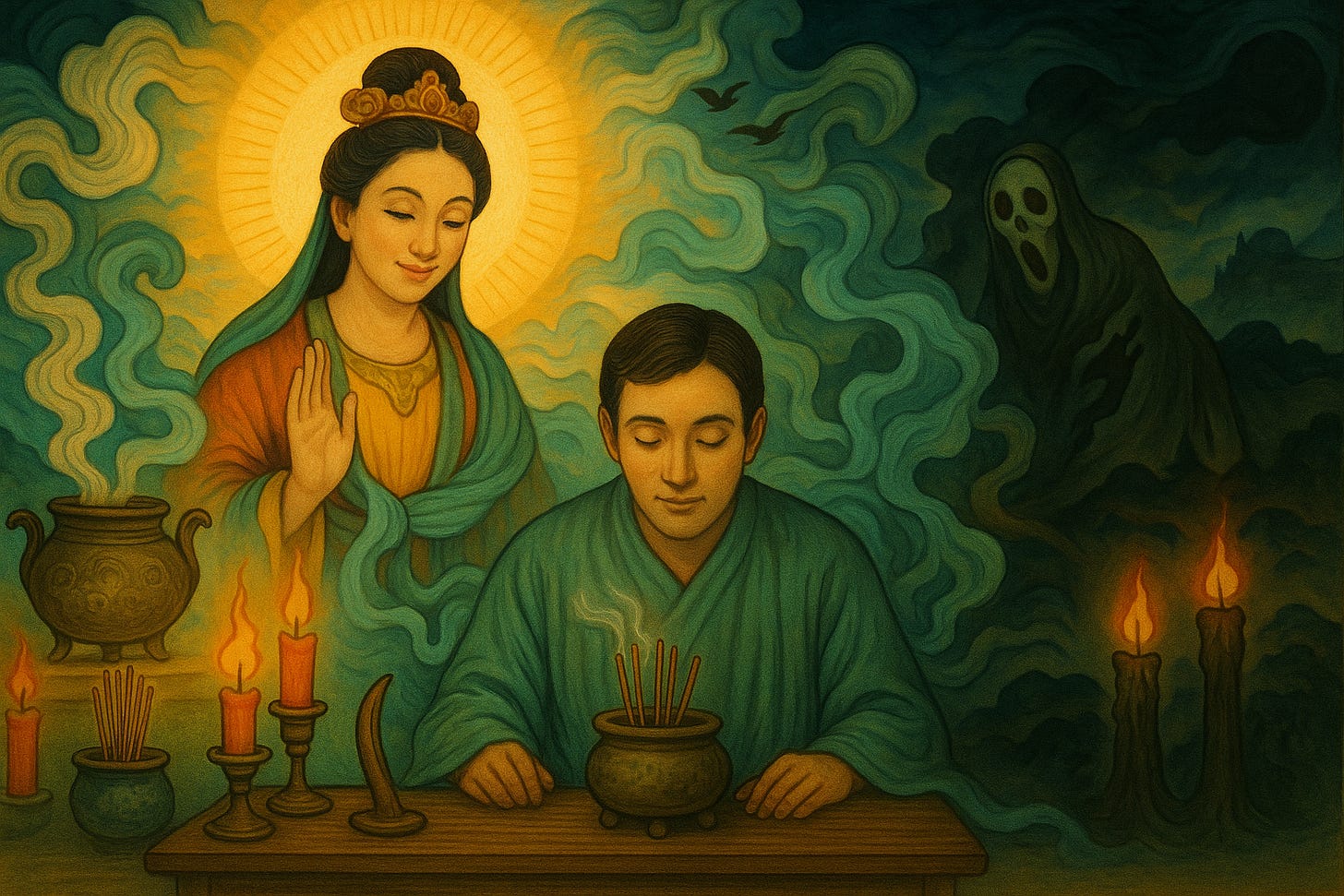When the Gods Descend
The Hidden World Behind Spirit Mediums (乩童) in Chinese Folk Religion
In temples veiled by the scent of burning sandalwood, amidst chants echoing from centuries past, a question trembles in the hearts of believers and skeptics alike:
When a 乩童 (spirit medium) enters a trance, what truly enters the body? Is it a god—or something else?
This question has haunted the corridors of Taoist temples and Chinese folk rituals for generations. To answer it, one must first understand the spiritual structure that governs what lies beyond the veil of the visible.
What is 分灵 – The Spirit That Descends?
In Chinese metaphysics, when a god “descends” into a medium, it is rarely the full divine form itself. What enters is called a 分灵—a divine extension, an emissary of the original deity. Think of it as a spark split off from a great flame. It carries the essence of the god, the power, the will—but it is not the entire celestial being.
Just like how a single candle can light a thousand more without losing its flame, a 本体神 (original deity) can generate countless 分灵 without diminishing its power. This spiritual fractalization allows the god to dwell in multiple places—within statues, in sacred tablets, or through the trembling body of a chosen medium—simultaneously.
But not every descending spirit is righteous. Not every flame glows with purity.
The Spirit Hierarchy: From Celestials to Shadows
Chinese cosmology outlines a layered universe of spirits, ranging from the highest deities to the lowest of wandering ghosts. At the top sit the 正神, the righteous gods—celestial beings with divine authority and moral clarity. Below them are 本体神, the original god-forms, from which 分灵 emanates.
Further down lie immortal spirits (仙灵) and ghosts (鬼魂)—souls of humans who transcended death or failed to move on. Earth spirits, like local land gods and city guardians, form a crucial layer in the spiritual ecology.
But beneath these lie the 妖魔 and 邪灵—deviant, parasitic entities. Tricksters. Tempters. Hungry shadows pretending to be gods, drawn to weak minds and open doors.
This is why 乩童 possession is not something to play with.
Why Would a Deity Enter a Human Body?
Why would an almighty being—a force vast enough to move stars—choose to enter the fragile frame of a human being?
The answer is not arrogance. It is mercy.
In Taoist and folk belief, gods descend not for glory, but for service. They respond to sincerity. When humans cry out for healing, justice, or guidance, the gods answer—not with thunder or visions from the sky, but through a body that trembles, convulses, and speaks with their voice.
The 乩童 becomes the bridge between heaven and earth. In that moment, their body is no longer their own. It is a 神体—a vessel of divine will.
But the human body is not an easy container. And not every possession is holy.
How to Tell the God from the Ghost: True vs False Spirits
In every temple, in every possession ritual, the unseen question remains:
Is this a true god—or a masquerade?
Those who walk the spiritual path must know how to distinguish a 正神 (righteous deity) from a 假灵 (false or deviant spirit). Here is how the experienced ones tell:
1. Ethical Consistency
A true god speaks with integrity. It uplifts. It heals. It instructs without pride and accepts when it does not know.
A false spirit brags, demands luxury offerings, and turns the ritual into theatre.
2. Ritual Signatures
Each deity moves, speaks, and behaves in distinct patterns. Guan Di is stern, strokes his beard, speaks in old phrases. Mazu is gentle, maternal. Nezha is explosive, childlike.
A false spirit may stumble, mix identities, or fail to use the correct tools—even when they are right in front of them.
3. Energetic Presence
True gods radiate an unmistakable force. The room stills. Goosebumps rise. Some cry without knowing why.
False spirits feel heavy, chaotic, sometimes nauseating. Animals grow restless. Candles flicker unnaturally.
4. Accuracy Over Time
Real gods speak truth that ripples across time. Their prophecies come to pass. Their healings endure.
False ones may get lucky once, then deceive, mislead, and disappear into contradiction.
5. Ego Test
The true 乩童 does not seek attention. They often forget what was said during trance.
If the medium craves fame, charges high fees, or boasts, the god may have left long ago—if it was ever there at all.
But What Are These Spirits Made Of?
According to ancient teachings, every being—mortal or divine—is a weave of 气 (qi), 神 (spirit), and 意 (intention). Humans have hun and po, the souls that divide after death. If improperly guided, they become ghosts. If refined through virtue and cultivation, they become immortal spirits.
Deities, on the other hand, are formed of refined celestial qi, moral power, and collective veneration. They do not “possess” out of hunger—but out of purpose. A 分灵 entering a 乩童 is not entering for amusement, but to fulfill karmic contracts, repair fates, and restore harmony between heaven and earth.
A Warning in Whispered Winds
When the drumbeats rise and the incense thickens, and a medium begins to shake, the veil between worlds is torn open. A divine presence may step through.
Or something else might.
Temples with lineage know this. That is why they vet their 乩童. They consecrate their altars. They prepare not just the body—but the space. For once that gateway opens, it cannot always be controlled.
To welcome a god is a sacred trust. To mistake a shadow for a star is to invite chaos in the name of faith.
So if you ever see a 乩童 speak in the voice of a deity, remember:
The body may be human.
The words may be divine.
But the truth of what stands before you—that lies in the quiet you feel… beneath your skin.





